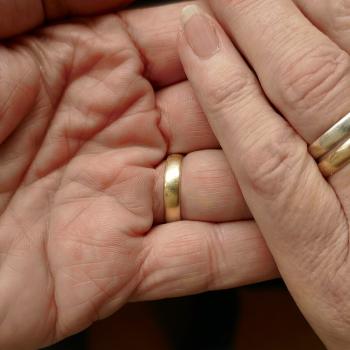Suffering is called “suffering” because it’s horrible. The amount of horror can vary from low-grade misery to unspeakable darkness, and furthermore some types of suffering are harder on a given marriage than others.
In addition to objective differences — a week with a bad cold is less suffering than years of intractable scream-out-loud pain — each couple is composed of two people with their own strengths, weaknesses, and quirks, as well as their own distinct resources.
Thus, for example, not having family or friends around to watch the baby while you finally catch up on your sleep can eventually drive a person to real live suicidal madness due to simple sleep deprivation. That’s a thing. In contrast, a life-threatening illness might be entirely manageable (albeit terrifying and unpleasant) if you’re blessed with an especially good support system and an illness that doesn’t happen to bring to the forefront you and your spouse’s worst traits.
We can’t, therefore, say that one type of situation is always harder on a marriage than a different type of situation.
***
The other difficulty with marriage is that it involves two people. One of you might be more virtuous than twenty saints combined, and the other one an absolute rotter. (This is actually a way to get canonized.) Usually what you get is two somewhat-virtuous people who waffle and flounder and sometimes manage to hold their act together just enough to muddle through.
But you can’t say to the friend going through a divorce, “Oh, dear one, if only you had been a better spouse, your beloved wouldn’t have walked out (or you wouldn’t have needed to call the cops and then avail yourself of the armed escort to flee for safety).”
[Let’s pause and be perfectly clear: The Church recognizes that separation and even civil divorce are sometimes necessary actions, if your estranged spouse poses a threat to your safety. In such cases often there are grounds for annulment, but if not, your fidelity to the sacrament is rightly practiced from a prayerful distance.]
***
Marriage is a union of two imperfect people. Sin, like suffering, runs on a scale. A marriage can endure quite a lot of both, but there’s one thing it can never endure, and that’s a spouse who decides not to be married anymore.
That’s true whether you’ve got run-of-the-mill daily toils or a situation so foul that the most hardened of the worldly shudder to contemplate it. You can make it easier for your spouse to stay, but you can’t make your spouse stay. Marriage is not dog-training school.
***
But we are men, not dogs. We are imperfect, prone to both sin and error, but we still have free will. The way that we view suffering and the way that we respond to suffering as a married couple do have a bearing on how our marriage will fare.
Without forgetting the massive list of caveats I just laid out above, these are some of the factors that I have found make a difference in whether a marriage is weakened or strengthened by a particular hardship:
- Do you resent that you’ve been singled out for suffering when other people have it so much better, or do you view this type of difficulty as one that may be unfair, but is part and parcel of living in a fallen world?
- Do you view this time as a “your life being taken away” or do you consider this just as much a part of “your life” as the good stuff — meant to be lived as well as you can manage, even though it won’t look the same as your life did in previous times?
- Do you hold yourself to an impossible standard, expecting that you’ll be just as prayerful and industrious and efficient and cheerful as you “always” are? Or do you recognize that right now you are simply not going to be able to accomplish some of the things you were able to do under better circumstances, and furthermore that it is normal to find your present situation aggravating, exhausting, overwhelming, scary, or sorrowful?
- Are you constantly stewing over your spouse’s shortcomings, or do you recognize and appreciate the ways that your spouse is sincerely trying to handle this difficult situation, no matter how imperfectly?
- Do you resent that your spouse isn’t handling this situation as well as some other person (real or fictional) to whom you are not married? Or do you appreciate that this is the person to whom you freely pledged your lifelong fidelity, and that however well or poorly your spouse is managing, this is the person you have chosen to love and cherish?
- Do you view your spouse as the enemy, or do you have a sense that the two of you are in this together? Do you find that your mission as a married couple isn’t just to savor the fun stuff, but to work hard, together, to make the most of all the trials that come your way?
- Do you view this situation as one that is depriving you of your chance to enjoy “what marriage should be” in your view of things? Or do you see it as a chance, however intensely unwanted, to prove that you meant it when you said “in sickness and in health” “for richer or for poorer” and “for better or for worse?”
- Do you view your present situation as something that is keeping you from being the best version of yourself? Or do you see it as a chance to find out what you’re made of and perhaps become a better version of yourself than you were before — if only a more humble one, now that you’ve discovered some of the limits of your abilities?
None of this requires you to be perfect. Mostly for a marriage to survive and even thrive during an ordeal you have to be forgiving. You have to be the kind of person who recognizes that yes, you and your spouse want to crawl into a hole and never come out, so it’s a pretty good day if you manage to drag yourself through something vaguely resembling responsible citizenship. You have to be the kind of person who says, “Go ahead and scream. I’ll just put this industrial ear protection on if it gets too loud.”
Or you can be a saint. That works, too.
But you can do this even if you’re not saint material yet.

Artwork by Rabanus Flavus (Own work) [Public domain], via Wikimedia Commons
















